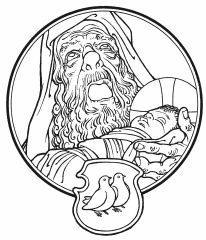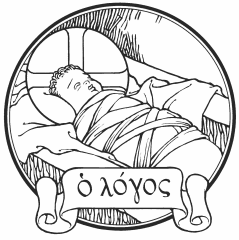 Grace, mercy, and peace to you from God our Father, and from our Lord and Savior, Jesus Christ, amen. The text for the sermon is the Gospel, which was read earlier.
Grace, mercy, and peace to you from God our Father, and from our Lord and Savior, Jesus Christ, amen. The text for the sermon is the Gospel, which was read earlier.
Saying goodbye is always a hard thing to do. I remember when I left Indiana in 2005 and made my way out to Wyoming. I said goodbye to family and friends, to my then-fiancée, and all that I knew that was comfortable to me and entered a world that was unknown. It was difficult to say the least. I knew that I would see family and friends and my fiancée again. I would talk to them, email them, see them on the computer. But it would not be the same as seeing them in person and it didn’t make saying goodbye any easier.
As we look at our Gospel reading for today, we see the time has come for Mary to be purified following her pregnancy and also the presentation of Jesus in the temple. It has been 40 days since Jesus was born and so they make their way to the temple for the necessary rituals. A sacrifice had to be made, either “a pair of turtledoves, or two young pigeons.” For Jesus, if He were to be given into service of the Lord, He was to be consecrated to the Lord. If the child was not given into the service of the Lord, the parents needed to redeem Him by a payment of five shekels. Mary and Joseph did not make this payment since Jesus was consecrated to the Lord in the fullest way possible. On the 40th day of His life, Jesus is presented to the Lord, as Luke records: “And…the parents brought in the child Jesus, to do for him according to the custom of the Law.”
How ironic this scene was. The Child Jesus is brought into the temple when He Himself is the very Temple of God. St. John writes, “And the Word became flesh and dwelt among us, and we have seen his glory, glory as of the only Son from the Father, full of grace and truth.” When John says that the Word “dwelt” among us, it literally means that Jesus set up His tabernacle or tent among us. This is a close tie-in to the temple. The people went to the temple because that is where the glory of God dwelled. Here is Jesus, who IS God in the flesh!
As the Holy Family was there in the temple, a man named Simeon enters the temple. He doesn’t enter it on his own accord, but he does so at the urging of the Holy Spirit. Luke says, “And it had been revealed to him by the Holy Spirit that he would not see death before he had seen the Lord’s Christ.” Simeon enters the temple and sees the Holy Family, goes to the Child and “took him up in his arms and blessed God.” This was an unusual thing to do, as it was the custom for the parents to offer the child to God. But now, here is a stranger that takes Jesus and offers Him to God. What kind of a person would do such a thing? But remember, Simeon did not do this on his own, but rather he did this as he was led by the Holy Spirit.
When Simeon saw that poor young couple coming into the temple to offer a sacrifice according to the Law, and the sacrifice, he knew it was not Mary and Joseph who would redeem their Son with the humble sacrifice. Simeon knew that their Son would redeem them, because He was the sacrifice.
As Simeon takes Jesus, He blesses God and says, “Lord, now you are letting your servant depart in peace, according to your word; for my eyes have seen your salvation that you have prepared in the presence of all peoples, a light for revelation to the Gentiles, and for glory to your people Israel.” He isn’t making a request of the Lord for Him to bless Jesus. Rather, he is making a statement of fact: “you are letting your servant depart in peace.” Simeon’s service in the temple as a watchman waiting for the fulfillment of the Old Testament promises is at an end. The watch is over; the servant can retire in peace. With the eyes of faith, Simeon sees more than a babe in his arms; he sees a Savior dying on the cross; he sees salvation for all people, both Israelite and Gentile. This is Simeon saying goodbye. For him, this is a not a sad goodbye, but rather a joyful goodbye. He is able to leave this world now, not in sorrow over what may or may not have occurred, but instead leaving this world in joy at seeing the promised Christ.
How is it that Simeon saw all of this in this child, just a little more than a month old? Mary and Joseph were an obscure poor couple and Jesus looked no different than any other 40-day old male child. Simeon could see all of this because “the Holy Spirit was upon him.” He could sing this wonderful song because God opened his eyes.
Joseph and Mary marveled at the words spoken by Simeon, but he is not finished yet. He shows insight that could come only by special revelation of the Holy Spirit concerning the destiny of this Child. Israel would be divided over Jesus – He would cause some to fall and some to rise. For some, Jesus would be a rock of offense over which they would stumble; for others, He would be the living rock of salvation.
What an example of faith that Simeon had. Simeon fully believed that God was going to make good on His promise and save His people from all their sins through the Savior He would personally send into this world. Through the working of the Holy Spirit, Simeon was promised by God that he would behold the Messiah with his own eyes in his lifetime, before God would call him home to heaven. Simeon waited. He was faithfully patient, trusting that God knew what He was doing and was doing it all according to His divine timeline, working all things for the good of His people. Simeon had faith that God would work this promise and plan when the time was right. Now having personally beheld God’s all-redeeming plan of salvation in the flesh, in his arms, Simeon was joyously relieved. It doesn’t matter whether Simeon was 25 or 95 years old. He could now die perfectly happy and content, fully knowing and trusting that God was keeping His promise and actively saving His people from all sin, death, and damnation. He knew what was really important in terms of life and salvation, and he knew that he was holding it right there in his very arms.
Saying goodbye is always hard. It is often filled with emotion and uncertainty of what is to come. Israel had no idea of what was to come in the years ahead when this Child would begin His ministry. However, Simeon was able to say goodbye without fear of what was to come because he saw God in the Christ child. Today, we are able to say goodbye without fear because we have seen Christ as well, in both His Word and in His blessed Sacrament of His body and blood. We sing this song of faith with all of the Church, both here and in heaven, as we leave our Lord’s Table from where He feeds us. There is only thing left for us to say: goodbye. In Jesus’ name, amen. Now the peace of God that passes all understanding, keep your hearts and minds through faith in Christ Jesus, amen.

